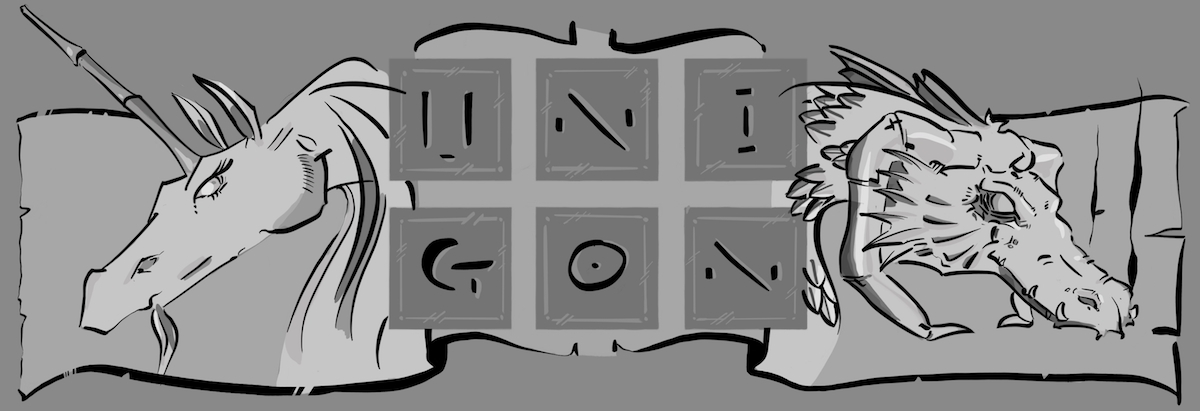For those of you who know me, that is not what you might think it means. I finally got the camera working on the 2D HTML5 engine I have started to engineer. It already supports some bells and whistles such as being completely configuration driven, and allows me to build arbitrarily sized maps from sprites. Already it uses a simple painter’s algorithm to make sure that sprites overlap each other in a way that makes senses from the 2D projection. And as of yesterday, I now have the camera following the player around the map, even correctly accounting for the edge of the world map. You can try it out if you want (Left = A, Up = W, Down = S, Right = D, Re-center = X).
Continue reading “camera works!”Category: Game Engine
Anything that has to do with game engines, both my internal development efforts and industry-standards such as Unity.
project unigon
I guess it makes sense to actually post in detail about project unigon, especially since this is why I created this blog in the first place. There are really two parts to this project; first, there is the motivations underlying the project; and second, there is the intent of the project itself, as it were. I already share a bit of this in the about section of this site, but to quickly recap, my passion is create storytelling experiences. And while my current day job is somewhat related to this, I wanted a more direct outlet to things I care about as a professional.
And like every (indie) developer out there, part and parcel of the process of developing a game (or any product for that matter) is determining what you can create with the resources you have available. And to be frank, even though I have over a decade’s worth of experience as a full-stack engineer, I have little experience developing games. So unlike game professionals who are just reapplying well-honed skills to their pet project, I must develop both the muscles and the application of said muscles. Why do I mention this? Because, part of project unigon is to expose me to the inner-workings of game engines, rendering, and story-telling. And frankly there are a lot of skills I need to hone before I really get this train out of the station. And of course, like any good project I hope that at the end of it I have something that I and others enjoying playing.
So what are the things that I want this game to be about? While I love playing a lot of different game plays, both the style of game that I enjoy and the style of game that I feel I can wrap my brain around the most completely is fantasy-based RPGs. Yes, there is really nothing too innovative here, and honestly, I am pretty okay with that. And after reading a bit of Joseph Kim over at Quarterview, his ideas around +1 Design resonate a lot with me. In a nutshell, he is talking about how to address the question of market differentiation to be competitive. He posits it is more effective to incrementally improve on a current success than try to complete on a revolutionary (and untested) game design. Granted, his insights are drawn more specifically from the mobile game marketplace which is hugely (grossly?) saturated. And since I am not motivated innovate deeply in the game space, I am arguably doing a bit of affirming the consequent, or some other silly fallacy nonsense.
But what kinds of games do I find fun and enriching? That is a long list that spans indie games like Fez!, Closure, Limbo, Journey, Kentucky Route Zero, Super Meat Boy, Dungeons of Dredmore, and Castle Crashers to name a few. And then there are the more main stream examples such as Skyrim, L.A. Noire, Last of Us, Walking Dead, and Assassins Creed II. Of late, I have been re-engergized by the emergence of games like CardHunter and Sorcery! which embody the kinds of gameplay that I find immensely satisfying, albeit for different reasons. CardHunter’s tactical movement with cards is an interesting take on battle mechanics, and Sorcery! which is as much just a good old-fashioned text-based action-adventure wrapped in a unique UX. And of course, if we look at the games where I have spent a lot of time then we need not go farther than Baldur’s Gate, to a lesser extent Perfect World’s NeverWinter, and of course, the undisputed king, BioWare’s DragonAge series. The one common thread is that all of them provide a deep story-telling mechanic set in a world which I personally find deeply satisfying. I am not arguing that these are revolutionary game designs, and that is very much my point. I am not, at least this point in my life, looking to re-invent a genre but instead just get deep into the creation of a deep, high-magic fantasy world.
